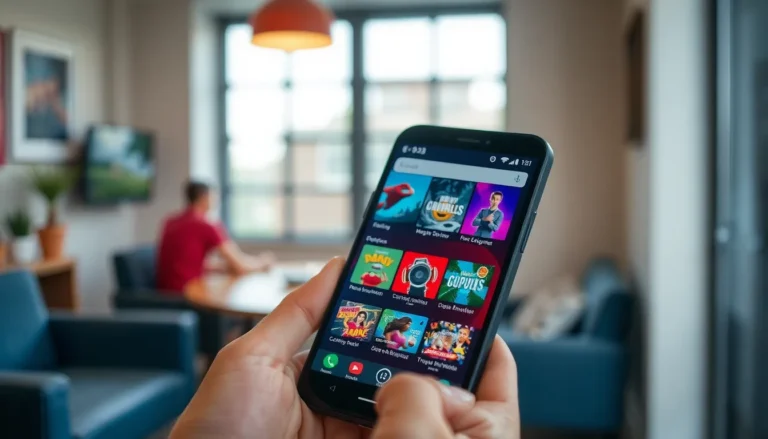Picture this: you’re all set to search for the latest iPhone news, and suddenly Google throws a CAPTCHA your way. It’s like trying to get into an exclusive club, but instead of a bouncer, you’ve got a quirky puzzle to solve. Frustrating, right?
This unexpected hurdle can leave anyone scratching their head, wondering why they must prove they’re not a robot just to check their favorite tech updates. But fear not! Understanding why Google requires these security checks can help demystify the process and make your search experience smoother. Buckle up as we dive into the reasons behind this digital detour and how you can navigate it like a pro.
Table of Contents
ToggleOverview Of The Issue
Users often find themselves challenged by CAPTCHA when searching for the latest iPhone news on Google. This digital security measure, while designed to protect websites, can lead to frustration and confusion. Many people ponder why such stringent checks are necessary during a simple search. It’s important to understand the context behind these requirements.
In many cases, Google’s CAPTCHA system identifies unusual traffic patterns. Search bots, like those from certain websites, can trigger these checks, causing legitimate users to encounter unexpected interruptions. Frequent searches or rapid clicking may also flag user behavior as suspicious, prompting CAPTCHA requests.
Security is a top priority for Google. The CAPTCHA system serves as a barrier against bots and automated scripts, which can compromise the integrity of search results. Protecting users’ data is critical in maintaining trust.
Moreover, users new to this experience might feel alienated by frequent CAPTCHA prompts. Staying informed about these changes and understanding their purpose can alleviate some frustration. Adjusting search habits, such as reducing the frequency of queries or spacing them out, may lessen the likelihood of encountering a CAPTCHA.
Recognizing these digital hurdles encourages smoother searching. Embracing a proactive approach to understanding these verification checks allows users to navigate the system more effectively, leading to a faster and more efficient search experience for the latest iPhone updates.
Why Is Google Asking For Captcha?
Google prompts CAPTCHA mainly to enhance security and ensure genuine user interactions. This mechanism detects unusual traffic patterns, which can indicate bot activity or suspicious behavior.
Common Causes
Frequent searches or rapid clicks often trigger CAPTCHA. Using multiple devices or networks can also raise flags. If a user’s IP address shows consistent and unusual activity, CAPTCHA activation becomes likely. Additionally, software like VPNs or proxies may obscure genuine user behavior, leading to further verification requests.
Impact On Users
Facing CAPTCHA requests frustrates users seeking quick information. Encountering repeated checks disrupts the search flow, causing delays and confusion. New users might find the process intimidating, leading to a sense of alienation. Adjusting search habits can minimize these interruptions, allowing for a more streamlined experience while searching for the latest iPhone updates.
Understanding Captcha
Captcha serves as a security measure, triggered by unusual online behavior. It ensures that genuine users interact with Google’s services while helping to protect against automated systems.
What Is Captcha?
Captcha stands for “Completely Automated Public Turing test to tell Computers and Humans Apart.” This security mechanism tests whether a user is human by presenting challenges that are easy for people but difficult for bots. Common forms include identifying distorted text, selecting images, or solving simple puzzles. Users encounter these tasks when Google detects suspicious activity, promoting a safer online environment.
Types Of Captcha
Various types of Captcha exist, each designed to thwart automated access. Text-based Captchas present distorted letters and numbers. Image selection Captchas ask users to pick specific items from a grid, such as traffic lights or bicycles. Invisible Captcha operates in the background, analyzing user behavior without explicit challenges. Mathematical Captcha typically involves solving basic arithmetic problems. Each type aims to enhance security and ensure that users engaging with Google services are human.
Potential Solutions
Users can take several steps to alleviate CAPTCHA prompts while searching for iPhone news on Google. Each method addresses common issues that contribute to frequent CAPTCHA requests.
Clear Browser Cache
Clearing the browser cache often helps eliminate data that can trigger CAPTCHA. Temporary files and cookies accumulate over time, which may lead Google’s algorithms to interpret user behavior as suspicious. Clearing the cache allows a fresh start for searches, potentially reducing CAPTCHA appearances. This process differs slightly across browsers, but it generally involves accessing settings, finding privacy options, and choosing to clear browsing data.
Disable Extensions
Disabling browser extensions can significantly reduce CAPTCHA requests. Some extensions interfere with web traffic, causing Google to perceive unusual activity. Popular ad blockers and privacy-focused extensions might inadvertently trigger security measures. Users should disable these extensions temporarily to see if the frequency of CAPTCHA checks decreases. Making this adjustment provides a more seamless search experience.
Use Incognito Mode
Using incognito mode offers a straightforward workaround for CAPTCHA issues. This mode disables extensions and prevents the browser from using cached data, presenting clearer interactions with Google’s servers. Open a new incognito window in your browser to initiate searches without the clutter of past preferences and stored data. Searching in incognito helps minimize the likelihood of triggering CAPTCHA and ensures a smoother experience while looking up the latest iPhone information.
Encountering CAPTCHA while searching for iPhone news can be frustrating but understanding its purpose helps ease the experience. By recognizing that these security measures protect both user data and search integrity users can navigate the digital landscape more effectively.
Adjusting search habits such as spacing out queries and clearing browser cache can significantly reduce CAPTCHA prompts. Implementing these strategies not only enhances the search experience but also minimizes disruptions caused by repeated verification requests.
With a few simple changes users can enjoy a smoother and more efficient journey while staying updated on the latest iPhone developments.




